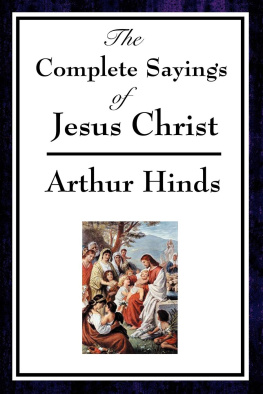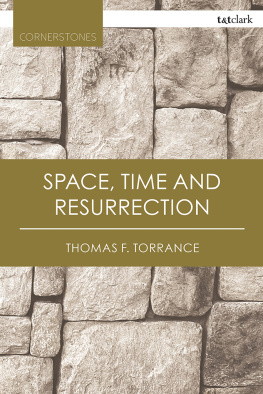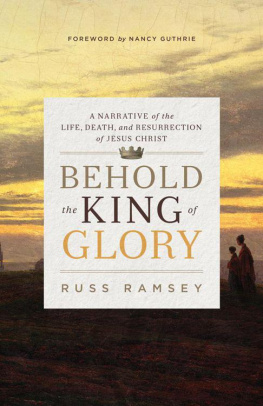Jesus Christ Jésus-Christ Jesus Christ. - Jesus in his Jewish context
Here you can read online Jesus Christ Jésus-Christ Jesus Christ. - Jesus in his Jewish context full text of the book (entire story) in english for free. Download pdf and epub, get meaning, cover and reviews about this ebook. City: Minneapolis, year: 2003, publisher: Fortress Press, genre: Religion. Description of the work, (preface) as well as reviews are available. Best literature library LitArk.com created for fans of good reading and offers a wide selection of genres:
Romance novel
Science fiction
Adventure
Detective
Science
History
Home and family
Prose
Art
Politics
Computer
Non-fiction
Religion
Business
Children
Humor
Choose a favorite category and find really read worthwhile books. Enjoy immersion in the world of imagination, feel the emotions of the characters or learn something new for yourself, make an fascinating discovery.
- Book:Jesus in his Jewish context
- Author:
- Publisher:Fortress Press
- Genre:
- Year:2003
- City:Minneapolis
- Rating:5 / 5
- Favourites:Add to favourites
- Your mark:
- 100
- 1
- 2
- 3
- 4
- 5
Jesus in his Jewish context: summary, description and annotation
We offer to read an annotation, description, summary or preface (depends on what the author of the book "Jesus in his Jewish context" wrote himself). If you haven't found the necessary information about the book — write in the comments, we will try to find it.
Jesus in his Jewish context — read online for free the complete book (whole text) full work
Below is the text of the book, divided by pages. System saving the place of the last page read, allows you to conveniently read the book "Jesus in his Jewish context" online for free, without having to search again every time where you left off. Put a bookmark, and you can go to the page where you finished reading at any time.
Font size:
Interval:
Bookmark:

also by Geza Vermes
The Dead Sea Scrolls in English (1962, 1975, 1987, 1995)
The History of the Jewish People in the Age of Jesus Christ by E. Schiirer, Vols I-III, revised and edited with F. Millar and M. Goodman (1973-87)
Jesus the Jew (1973, 1983, 1994, 2001)
The Essenes according to the Classical Sources, with M. Goodman (1989)
The Religion of Jesus the Jew (1993, 2002)
The Complete Dead Sea Scrolls in English (1997, 1998)
Providential.4ccidents: An Autobiography (1998)
Discoveries in the_Judaean Desert XXVI, with P. S. Alexander (1998)
An Introduction to the Complete Dead Sea Scrolls (1999, 2000)
The Changing Faces offesus (2000, 2001)
The Authentic Gospel ofJesus, 2003 (forthcoming)
Jewish Context
GEZA VERMES
vii
My scholarly involvement with the historical Jesus began thirty years ago with the publication in 1973 of Jesus the Jew: A Historian's Reading of the Gospels, in which I sought to determine what kind of a person Jesus of Nazareth was by firmly setting this charismatic teacher, healer and exorcist in the real world of first-century Palestinian Jews. The pioneering volume was then further developed with a view to paying more and more attention to the doctrinal aspects of the message of Jesus and the nature of the Jewish religion that he preached and practised. This effort produced two further books at ten-yearly intervals, Jesus and the World ofJudaism (1983) and The Religion of Jesus the Jew (1993). The three volumes add up to a trilogy demonstrating the authentic Jewishness of Jesus. The present collection of studies is meant to replace and enrich further Jesus and the World of Judaism. All three volumes intended for both scholars and a general readership are available from SCM Press, London, in Britain and Fortress Press, Minneapolis, in the USA.
In general, my contributions to the study of the historical Jesus have been received with sympathy in Britain and Europe. Nevertheless, they occasionally met with open hostility in the United States especially in the wake of some harsh words said about my method by Professor John P. Meier in .-I Marginal _ew: Rethinking the historical Jesus. 1 I usually do not respond to criticism and leave it to the readers to form their own judgement. `Here is my pudding', I like to tell them. 'T'aste it before you start finding fault with the recipe. The proof of the pudding is in the eating.' This time, however, I have been persuaded by friends and colleagues to make an exception.
Father Meier has raised two serious objections against my way of portraying Jesus. He has accused me of lacking `methodology' and of making an `acritical' use of the rabbinic sources.
His first charge is based on a misunderstanding of a remark, which I made on methodology. Professor Meier interpreted it a la lettre although it appeared in the context of a jocular piece of self-mockery. In The Religion of Jesus the Jew (1993, p. 7) I wrote, `In my opinion, research aiming to be innovative should not be bound by strict, predetermined rules. Indeed, although the claim coming from someone, horn in Hungary, educated in Belgium and France, and citizen of the United Kingdom by naturalization only, may strike a faintly amusing note, I nevertheless pride myself on being a true British pragmatist.'
Struck by my `disdain for methodology' and `preference for "muddling through"', a very British habit, Professor Meier thought it fit to lecture me on the rudiments of proper academic proceeding. `Any scholarly investigation', I was told, `that is not totally erratic operates by certain rules.'z It does indeed. Yet if this otherwise so meticulous researcher had taken the trouble to read, or even just glance at my essay, `Jewish Studies and New Testament Interpretation: Reflections of'Methodology', deliberately cited on the same page as the quotation which so upset him, he might have realized that I am not as unprincipled as he seems to imagine. The paper in question was my presidential address to the First Congress of the European Association for Jewish Studies.' I set out in it the programme of a `dynamic' approach to rabbinic evidence.' This method seeks first to trace with the help of all the available data the evolutionary curve of a given theme, and then to determine the precise place on that literary curve of the various examples of this theme.
Instead of analysing the documents, Meier adopts a simplistic stand in his dealing with rabbinic literature. For him the date of a tradition is determined by the date of the literary source, which transmits it. So he simply declares Mishnah, Midrash, 'Talmud and Targum unfit for use in the study of Jesus because their redaction occurred after the composition of the New 'T'estament (late first-early second century AD), namely between, say, AD zoo and Soo. But scholars familiar with the works of the rabbis are well aware that a rabbinic anthology often contains teachings and interpretations, which are centuries older than the final compilation in which they are housed. They also know that it is possible to distinguish ancient elements from more recent material.
Professor Meier's second point of disagreement with me concerns my `acritical' use of the rabbinic sources. The issue arises from my application to Jesus of the concept `charismatic Hasid', which I have modelled mostly on the Mishnaic-Talmudic, but also partly on the Josephan, portrayal of two Jewish `miracle workers', Honi (first century BC) and Hanina hen I)osa (first century AD). My approach to the figure of the charismatic Hasid was typological. I argued from features, which are attested and verifiable in all the historical periods of ancient Judaism from the age of the eighth century tic Old Testament prophets down to the 'I'annaitic and Amoraic rah his in the early centuries of the Christian era. Anyone acquainted with my publications, which now stretch over more than fifty years, can see that I am fully aware of the time factor affecting the rabbinic sources and of the evolutionary process characteristic of them. After all, I spent more than twenty years on rewriting and re-editing The History of the3ewish People in esus Christ,' Emil SchUrer's monumental classic, the textbook the. ge of' on the period of the Gospels.
Yet Professor Meier thinks otherwise (see vol. II, pp. 586-87). 'Despite the fact', he writes, 'that many of the traditions about Hanina ben Dosa do not find any literary attestation earlier than the two Talmuds, Vermes suggests that in some of the statements attributed to Hanina we may possess genuine sayings of "a remarkable personality living in first-century Palestine", sayings that "constitute the most direct insight we possess into the Hasidic mind and outlook." That Vermes can make this claim when discussing sayings attributed to Hanina in Pirye [de-]Rabbi Eliezer (dating to the eighth or ninth century AD] leaves one speechless.... Ultimately, Vermes' acritical use of sources undermines his whole argument.' Some indictment.
John Meier is usually punctilious in giving page references, but for some reason he omits here to indicate the source of the statement which has left him speechless. The extract is borrowed from my essay, `Hanina hen Doss' (77S 23, I972, P. So), in which among many other things I examine the surviving maxims attributed to this Galilean holy man. Here are my exact words, `If the first three, and possibly four sayings [namely i. Mishnah Abot 3:9a; 2. Abot 3:9b; 3. Abot 3:10; 4. Babylonian Talmud Berakhot 33a (baraita, i.e. a Talmudic text attributable to Tannaitic rabbis of the first or second century AD)] are accepted as genuine, they echo not only the voice of a remarkable personality living in first century Palestine, but also constitute the most direct insight we possess into the Hasidic mind and outlook, since the other much larger collection, that of the contemporaneous teachings ofJesus of Nazareth, is extant only in a foreign language and an alien arrangement.'
Font size:
Interval:
Bookmark:
Similar books «Jesus in his Jewish context»
Look at similar books to Jesus in his Jewish context. We have selected literature similar in name and meaning in the hope of providing readers with more options to find new, interesting, not yet read works.
Discussion, reviews of the book Jesus in his Jewish context and just readers' own opinions. Leave your comments, write what you think about the work, its meaning or the main characters. Specify what exactly you liked and what you didn't like, and why you think so.











